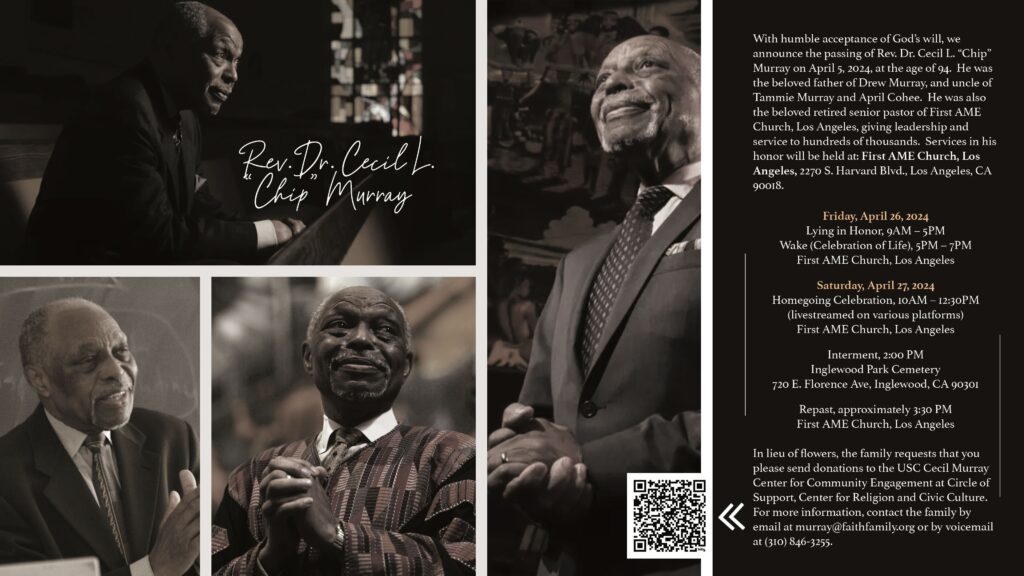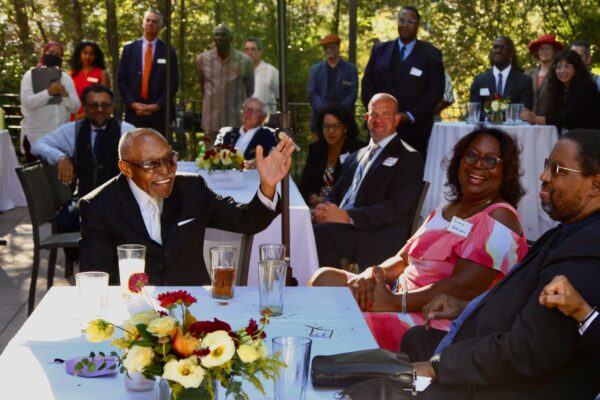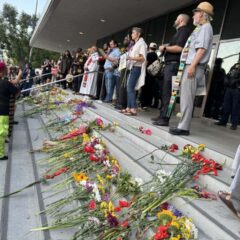Until the pandemic, the Rev. Dr. Cecil L. “Chip” Murray was the first person in the USC Center for Religion and Civic Culture’s office every morning. Then 90 years old, he would open the gate to welcome guests looking for career or academic mentoring, advice about how to lead a church or take social action, or simply a compassionate ear.
After sharing ministerial challenges on one such visit, the Rev. Kelvin Sauls remembers Rev. Murray did not offer easy solutions. Instead Murray, known for faith-led civic engagement, told Sauls, “Don’t grow weary in well-doing,” Sauls recalls. “Those are words that continue to ground me.”
Such wisdom remains with the thousands of people who considered Rev. Murray their pastor. Rev. Murray died at age 94 on Friday, April 5.
Born on September 26, 1929, in Lakeland, Florida, Rev. Murray grew up in the segregated south. He graduated from Florida A&M University and joined the U.S. Air Force. After serving for 10 years, he retired as a major. He then earned a Ph.D. in religion from the School of Theology at Claremont College and became a minister in the African Methodist Episcopal (AME) church, serving in four congregations until age 75.
Rev. Murray does not retire but simply retreads, his niece Tammie Murray said at his 2022 retirement party from his third career at the University of Southern California. At USC, Murray served as the Tansey Professor of Christian Ethics and chair of the Cecil Murray Center for Community Engagement. He trained about 1,000 faith leaders in the “Murray Method” of church leadership, equipping them to transform their communities, as he had helped to transform South Los Angeles as a pastor. “To culminate my years of work as a USC Trojan is the exclamation point of my life!” he wrote in his resignation letter.
Pastor of Los Angeles
Rev. Murray became an influential city leader during his 27 years as pastor of the First African Methodist Episcopal (FAME) Church of Los Angeles. His distinctive theology of deep personal spirituality combined with socially engaged Christianity helped him transform a small congregation of 250 members into an 18,000-person megachurch. Community members worshiped alongside celebrities and city leaders such as Mayor Tom Bradley, Los Angeles’ first African American and longest-serving mayor.
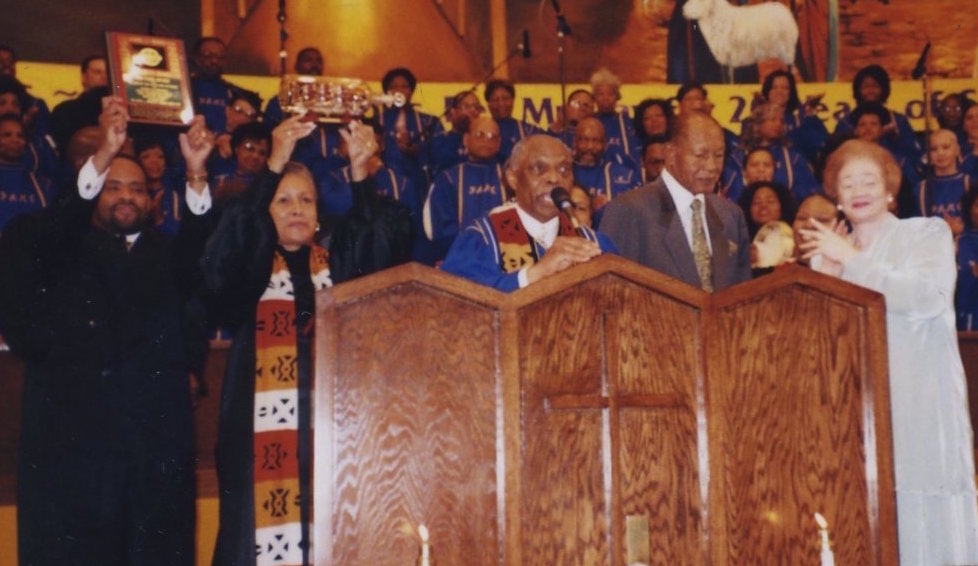
In 1992, the suspended sentence of 15-year-old Latasha Harlin’s killer and the acquittal of police officers charged with beating Rodney King sparked one of the most destructive episodes of urban violence in U.S. history. In the weeks leading up to the verdict in the case against Rodney King’s attackers, Murray used his connections with Mayor Bradley as well as with faith and private-sector leaders to lay the groundwork for strategies to quell the rage he knew an acquittal might unleash. When his worst fears were realized, he stepped into the fray to conciliate between rioters and police.
“While many famous preachers have roots in Southern California, Chip Murray is unparalleled in his ability to mobilize the city of Los Angeles to heal the inequities related to race and income inequality,” said Donald E. Miller, the Leonard K. Firestone Professor of Religion at USC and co-founder of the Center for Religion and Civic Culture.
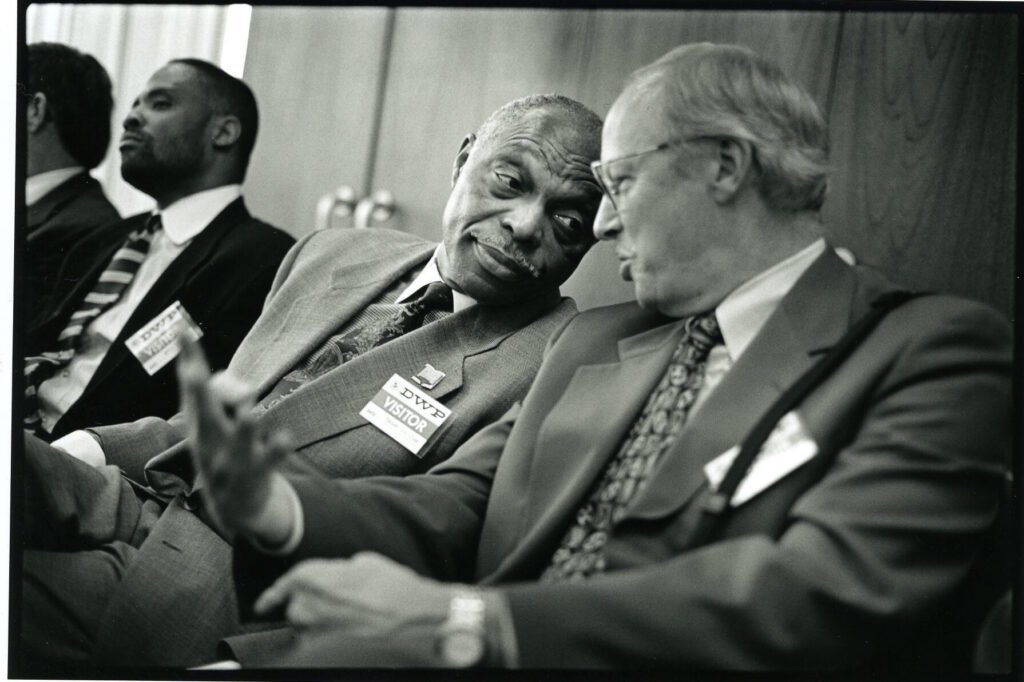
Murray was the first person Miller interviewed in the aftermath of the unrest, seeking to understand the role of faith communities in rebuilding the city following the unrest. That research led to the founding of CRCC.
“First AME Church had already established a reputation, and corporations were seeking a way to invest in low-income neighborhoods, one that had integrity and a track record,” Miller explained. “Chip Murray’s prophetic preaching, combined with a choir and organ that could rock the rafters of the church, were the foundation for the establishment of FAME Renaissance, the non-profit investment arm of the church, which took a leading role in rebuilding South LA.”
FAME Renaissance brought $400 million in investments to L.A.’s minority and low-income neighborhoods, and Murray used his influence with City Hall and beyond to advocate for solutions to the social and economic ills that had spawned the unrest.
“Reverend Murray was an inspiring interfaith leader, whose life was defined by a unique ability to connect and empower diverse communities,” said USC Dornsife Dean Amber D. Miller. “He leaves us with an enduring example of the impact that can be made on society when we commit to understanding issues deeply and engaging others in challenging but respectful dialogue.”
Rev. Murray at USC
In 2004, when Rev. Murray reached the retirement age of 75 within the AME Church, he joined USC’s faculty at the invitation of the president and provost.
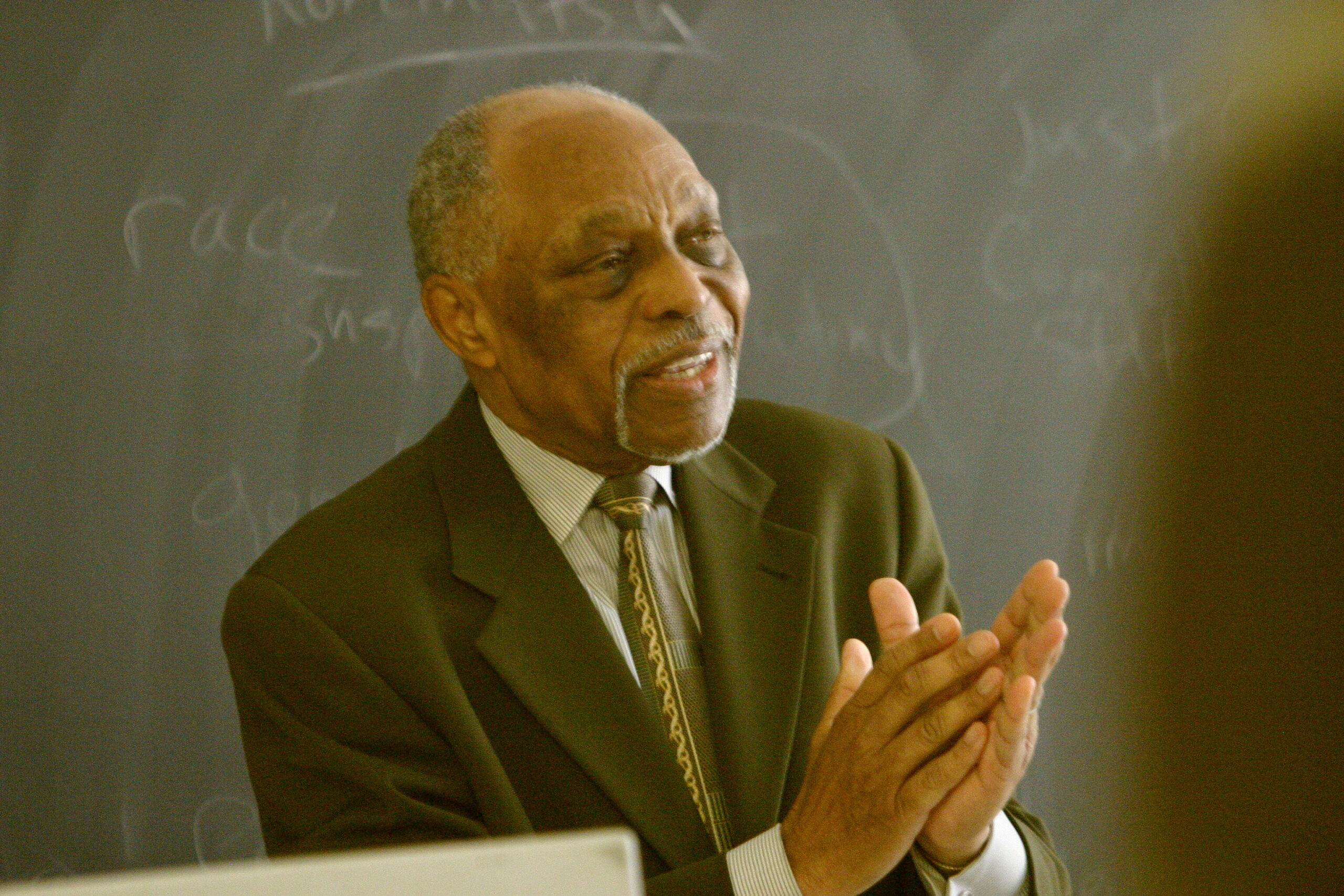
At USC, Murray started the Passing the Mantle program, which would become the Cecil Murray Center at CRCC. Through the Murray Center, Murray led initiatives that engaged lay and pastoral faith leaders in developing projects to serve their communities.
“Dr. Murray’s impact is seen through the myriad of faith leaders, activists and local politicians who are doing the work of community development and public policy today,” said Smith, who now leads the Murray Center’s programming. “He helped make Los Angeles a model of effective and pluralistic faith-based civic engagement.”
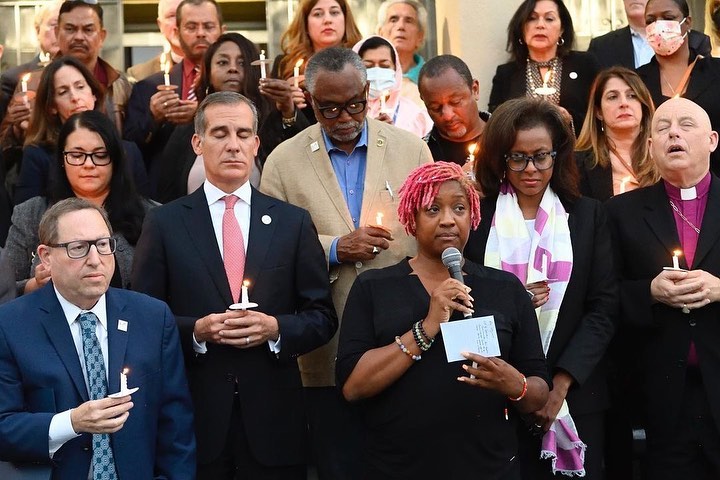
Moreover, he leaves a lasting legacy at USC.
“Rev. Murray’s efforts to improve communities and individual lives in Los Angeles is a core reason for the existence of the Center for Religion and Civic Culture,” said Richard Flory, CRCC’s executive director. “His presence and activities in the city inspired the initial research project that set the agenda for CRCC, and his approach continues to inspire both our research and work in the community. We strive to continue Rev. Murray’s legacy by helping faith and community leaders become full partners in the work of positive social change.”
USC President Carol Folt said at his retirement party that the spirit in which he worked stands out. “Your work will continue because of the thousands and thousands of people you’ve inspired, because of the truth of the work, the goodness of the work, and its abiding message,” she said.
Murray is preceded in death by his wife, Bernadine. He is survived by son Drew, niece Tammie Murray, nephews Anthony Murray and Kevin Murray, grand niece April Cohee, and grand nephews Isaiah Murray and Corey Murray.
Services will be held at First AME Church, Los Angeles. On Friday, April 26, 2024, he will lay in honor from 9 am – 5 pm, with a wake from 5 – 7 pm. His homegoing celebration will take place on Saturday, April 27 at 10 am, livestreamed across various platforms, with internment following at 2 pm at Inglewood Park Cemetery.
The family has requested that in lieu of flowers, donations be made to Rev. Murray’s Circle of Support to help the USC Center for Religion and Civic Culture continue his legacy.
To give, visit the secure “giving to USC” page. Please make sure to check the “USC Murray Center for Community Engagement” box.
